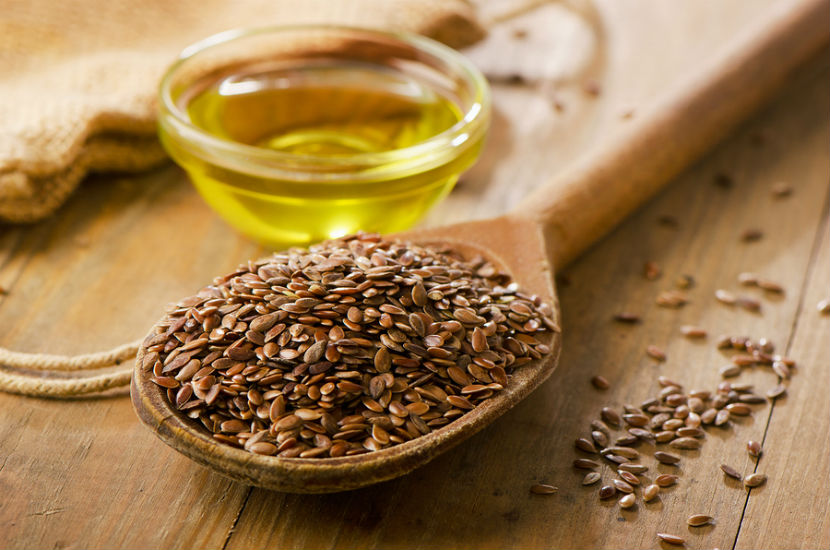
Flax seeds are rich in many nutrients that are important for good health. In addition, they add great flavour and texture to many different foods. Read on to learn more about flax seeds and what they can do for you.
What are flax seeds?
Flax seeds are oval and flat shaped seeds that are slightly larger than sesame seeds. They have a crisp, chewy texture with a nutty flavour. Flax seeds can be brown or yellow in colour. Brown flax seeds are what you will likely find in grocery stores.
What types of flax seeds are there?
You can find flax seeds in three different ways:
-
Whole flax seeds: These are often added to breads and muffins to add texture and make them more visually appealing.
-
Ground flax seeds: These are added to foods for flavour and their nutrients.
-
Flaxseed oil: This oil is made from flax seeds and is often sold on its own in grocery stores or used in items like salad dressings.
Which type of flax seed should I choose: Whole, ground or flaxseed oil?
Ground flax seeds
Are the most nutritious. Grinding the seeds makes them easier to digest and helps release their nutrients. Your best bet is to enjoy ground flax seeds to get the most this seed has to offer.
You can buy ground flax seeds or grind them yourself with the tools you already have in your kitchen. Grind flax seeds at home with a coffee grinder, food processor or blender.
Flaxseed oil
Provides the highest amount of alpha-linolenic acid, an omega-3 fat. However, there is little fibre or protein in flax oil. It is best used in a salad dressing or added to vegetables before serving.
Whole flax seeds
May pass through your body without being digested.
Flax seeds are nutritious
Flax seeds are a rich source of essential nutrients. The table below shows which nutrients are found in 1 Tbsp (15mL) of flax seeds:
|
Nutrient
|
Amount
|
|
Fat
|
4g
|
|
Omega-3 fats
|
2.5g
|
|
Fibre
|
3g
|
|
Protein
|
2g
|
Because of the nutrients found in flax seeds, flax is thought to be a functional food. This means that flax gives you added health benefits.
Flax may help prevent heart disease:
Flax seeds are especially high in alpha-linoleic acid, a type of omega-3 fat. Omega-3 fats help lower the risk of heart disease.
Flax helps to keep your bowels healthy:
Flax seeds provide a good source of dietary fibre which is important for a healthy digestive system.
Flax helps to fight cancer:
Flax seeds are one of the richest plant sources of lignans, a type of phytonutrient. These phytonutrients may have a role in protecting our bodies from certain types of cancer.
Flax seeds may have additional health benefits
There is a lot of research being done to explore the benefits of flax seeds. Flax may help to:
-
Lower blood-cholesterol, especially for people with high blood pressure
-
Prevent some types of cancer, like prostate and breast cancer and
-
Relieve menopausal symptoms in women
-
More research is needed to determine the health benefits of flax.
Store flax seeds properly to keep them fresh
Because of their hard shells, whole flax seeds can be stored at room temperature for up to a year. Ground flax seeds can be refrigerated in an airtight container that is not see-through for up to 3 months. Flaxseed oil should be stored in the fridge and used before its expiration date. To enjoy flax seeds at their best, grind whole flax seeds as you need them.
Flax seed meal and snack ideas
Flax seeds and flax seed products can be found in most grocery stores, bulk food stores, health food stores and specialty food stores. Whole seeds often come in bulk and ground seeds will often come vacuum-packed to keep them fresh. Aim to include flax seeds in your diet along with a variety of other foods. Like other fibre-rich foods, it is important to add flax to your diet slowly and drink plenty of fluids.
Try some of these ideas to add flax to your diet:
-
Sprinkle ground flax seeds on cereals, granola or yogurt. Add it to a fresh salad for lunch or dinner.
-
Add ground flax to doughs, batters and casseroles.
-
For added crunch, sprinkle whole flax seeds on top of home baked goods like muffins and breads.
-
Substitute flax seeds instead of oil in baking. Use 1 cup of ground flax seed for 1/3 cup of oil (3:1 substitution ratio).
-
Avoid cooking with flaxseed oil. The nutrients in the oil are lost with high heat. Instead, try flaxseed oil with your favourite homemade salad dressings.
Bottom line
Adding flax seeds to your diet is a great way to get nutrients like fibre, protein and omega-3 fats. They have many health benefits and more research is being done to determine all the health benefits flax seeds have to offer. Enjoy ground flax seeds and flax seed oil to get the most health benefits.
Last Update – October 31, 2018